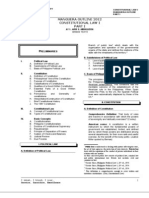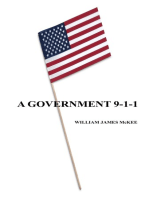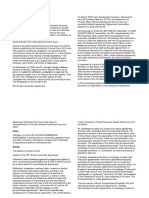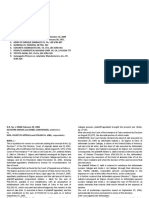0 ratings0% found this document useful (0 votes)
31 viewsQ#1 (Open Notes) Introduction: Passing 12
Q#1 (Open Notes) Introduction: Passing 12
Uploaded by
joshstrike21This document contains questions about political science concepts and the Philippine constitution and government. It covers topics such as the definition of political science, the formal objects and subjects of political science, the functions of government, forms of government in Philippine history from the pre-Spanish period to today, the distinction between state and government, the 1987 Philippine Constitution, and principles like rule of law and separation of powers. The questions are divided into multiple sections with varying point values and include some bonus questions at the end of each section.
Copyright:
© All Rights Reserved
Available Formats
Download as DOCX, PDF, TXT or read online from Scribd
Q#1 (Open Notes) Introduction: Passing 12
Q#1 (Open Notes) Introduction: Passing 12
Uploaded by
joshstrike210 ratings0% found this document useful (0 votes)
31 views4 pagesThis document contains questions about political science concepts and the Philippine constitution and government. It covers topics such as the definition of political science, the formal objects and subjects of political science, the functions of government, forms of government in Philippine history from the pre-Spanish period to today, the distinction between state and government, the 1987 Philippine Constitution, and principles like rule of law and separation of powers. The questions are divided into multiple sections with varying point values and include some bonus questions at the end of each section.
Original Description:
quiz
Original Title
consti
Copyright
© © All Rights Reserved
Available Formats
DOCX, PDF, TXT or read online from Scribd
Share this document
Did you find this document useful?
Is this content inappropriate?
This document contains questions about political science concepts and the Philippine constitution and government. It covers topics such as the definition of political science, the formal objects and subjects of political science, the functions of government, forms of government in Philippine history from the pre-Spanish period to today, the distinction between state and government, the 1987 Philippine Constitution, and principles like rule of law and separation of powers. The questions are divided into multiple sections with varying point values and include some bonus questions at the end of each section.
Copyright:
© All Rights Reserved
Available Formats
Download as DOCX, PDF, TXT or read online from Scribd
Download as docx, pdf, or txt
0 ratings0% found this document useful (0 votes)
31 views4 pagesQ#1 (Open Notes) Introduction: Passing 12
Q#1 (Open Notes) Introduction: Passing 12
Uploaded by
joshstrike21This document contains questions about political science concepts and the Philippine constitution and government. It covers topics such as the definition of political science, the formal objects and subjects of political science, the functions of government, forms of government in Philippine history from the pre-Spanish period to today, the distinction between state and government, the 1987 Philippine Constitution, and principles like rule of law and separation of powers. The questions are divided into multiple sections with varying point values and include some bonus questions at the end of each section.
Copyright:
© All Rights Reserved
Available Formats
Download as DOCX, PDF, TXT or read online from Scribd
Download as docx, pdf, or txt
You are on page 1of 4
Q#1 (Open Notes) Introduction
No. Question/Item Points
1. Define Political Science. 3
2. State and briefly discuss the “formal objects” of Political 2
Science.
3. State and briefly discuss the “subjects” of Political Science. 2
4. What are the general scopes of Political Science? 3
5. State three (3) functions, importance and/or goals of Political 3
Science.
6. Define the concept of state. 3
7. State the elements of state. 4
Total 20
Passing 12
Bonus:
What does the Greek word “polis” mean? 1
What does the Latin word “scire” mean? 1
Q#2 (Module I) Introduction: Basic Concepts
No. Question/Item Points
1. Define/Discuss the concept of Government. 2
2. Define/Discuss the concept of State. 2
3. Name three (3) functions, importance and/or goals of Political 3
Science.
4. State a distinction between “state” and “government” 1
5. Classify the form of the present Philippine government:
(a) As to the number of persons exercising sovereign 2
powers
(b) As to the relationship between the executive and the 2
legislative branches of government.
(c) As to the extent of powers exercised by the central or 2
national government
6. Why is a government necessary? 1
7. What relation/s is/are the Subject Matter/s of Political Science? 3
8. What is the Social Contract Theory? 2
9. Define/Discuss the concept of Sovereignty. 2
10. Define/Discuss Political Theory 2
11. Define/Discuss Political Science 2
12. State a distinction between “state” and “nation” 1
13. State the four (4) theories relating the origin of the State 4
14. State the inherent powers of the State 3
15. What are the Elements of a State? 4
16. What are the general areas/fields addressed by Public Law? 4
17. What is Public Administration? 1
18. What is the Formal Object of Political Science? 1
19. What is the purpose of government? 1
Total 45
Passing 27
Bonus:
State and briefly discuss the difference between the powers of 5
the executive and judicial branches of government.
Q#3 (Module II) Governments of the Philippines: History& Evolution
No. Question/Item Points
1. State the type/s of government during the following periods. 15
(a) Pre-Spanish (b) Japanese Occupation
Period
(c) Spanish Period (d) Martial Law
(e) Revolutionary (f) Aquino C. Administration to
Era the present administration
(g) American
Regime
2. State the first three (3) republic governments established in 9
the Philippines as well as the “event/circumstance with which”
or the “period when such government was constituted.”
3. What form of government was the “barangay” during the Pre- 3
Spanish Period? Explain.
4. What were the powers of the Governor-General during the 4
Spanish Period?
5. What is a revolutionary government? 3
6. What law allowed for the establishment of a Commonwealth 1
government during the American Regime?
7. What was the effect of the declaration of Martial Law on the 2
then government structure of the Phils.?
8. What is the nature/form of our present government? 3
9. Define the following concepts 10
(a) De Jure Government (b) A government under
Martial Law
(c) De (d) Puppet Government
Facto Government
(e) Republican
Government
Total 50
Passing 30
Bonus:
What does the acronym “KKK” mean? 1
When was Martial Law declared by Pres. Ferdinand Marcos? 1
Q#4 (Module III) The Philippine Constitution: Introduction
No. Question/Item Points
1. State all the Constitutions that were enforced in the Philippines. 6
2. Describe the Constitution of the Philippines. 3
3. What is the purpose of a Constitution? 2
4. State an advantage and disadvantage of a written constitution. 2
5. Distinguish a “conventional or enacted” from a “cumulative or 3
evolved” constitution.
6. What law allowed for the establishment of a Commonwealth 1
government during the American Regime?
7. Describe the 1987 Constitution according to the manner with 2
which its provisions can be amended.
8. State three (3) requisites of a good written constitution. 3
9. State the three (3) sets of provisions which are required in a 3
good written constitution.
10. State two (2) distinctions between a Constitution and a State. 2
11. Who can interpret the Constitution? 2
12. What is the purpose of interpreting the Constitution? 2
13. Briefly explain the principle of “the rule of the majority.” 2
14. Briefly explain the principle of “government of men.” 2
15. Fill-out the blanks. 15
“We, the ___________ Filipino people, imploring
the aid of ___________ ___________, in order to build a
__________ and __________ society, and establish a
_________that shall embody our ideals and aspirations,
___________ the _________ ___________, conserve and
develop our patrimony, and secure to ourselves and our
posterity, the blessings of ___________ and _________
under the _________ of ___________ and a regime of
truth, ___________, freedom, love, ___________, and
peace, do ordain and promulgate this Constitution.” (1987
Constitution, Preamble)
Total 50
Passing 12
Bonus:
What does the Latin term “preambulare” mean? 3
(3) basic principles underlying the1987 Constitution. 3-5
You might also like
- Chapter 3 RGDocument5 pagesChapter 3 RGdavidbrummNo ratings yet
- PreambleDocument18 pagesPreambleJayrold Catandijan LertidoNo ratings yet
- Comparison and Contrast of Philippine ConstitutionDocument4 pagesComparison and Contrast of Philippine ConstitutionLeoncio Boco100% (3)
- Ap Gov U1 Constitition Federalism Packet Fa19Document57 pagesAp Gov U1 Constitition Federalism Packet Fa19ilya228888uNo ratings yet
- 1st Year Civics EMDocument19 pages1st Year Civics EMB Lakshmi narayana reddyNo ratings yet
- San Sebastian College Recoletos: InstructionsDocument3 pagesSan Sebastian College Recoletos: InstructionsElbert AtienzaNo ratings yet
- Chapter 3 Section 1and 2 Guided Reading Questions With AnswersDocument5 pagesChapter 3 Section 1and 2 Guided Reading Questions With AnswersJayden DodgeNo ratings yet
- Lesson 3.0-3.9 The 1987 ConstitutionDocument7 pagesLesson 3.0-3.9 The 1987 ConstitutionwendymbaguioNo ratings yet
- RPH Main Topic 4 ReviewerDocument6 pagesRPH Main Topic 4 Reviewerandel.joseph00No ratings yet
- How To Find Gods WillDocument3 pagesHow To Find Gods WillADENIKE AWOJOBINo ratings yet
- Phil His and Consti Midterm ExamDocument1 pagePhil His and Consti Midterm ExamAnonymous SBT3XU6INo ratings yet
- MODULE 6 PreambleDocument3 pagesMODULE 6 PreambleYvonne CataluñaNo ratings yet
- CH 4 Part 1Document8 pagesCH 4 Part 1Sintayehu AbebeNo ratings yet
- Revised Module GEEED 20023 Phil. PoliticsGovernance and Citizenship2nd Sem 2023Document72 pagesRevised Module GEEED 20023 Phil. PoliticsGovernance and Citizenship2nd Sem 2023IIHC SMAW NC II LUCEÑA, ANGEL LANCE JERICHO A.No ratings yet
- Paper State and Constitution Group 2Document12 pagesPaper State and Constitution Group 2Azelia AqshalinaNo ratings yet
- 2019 Redesign Unit 1 Review Packet - Ready To PostDocument8 pages2019 Redesign Unit 1 Review Packet - Ready To Postluketfood101No ratings yet
- Revised Module GEEED 20023 1st Sem 2022 2023Document71 pagesRevised Module GEEED 20023 1st Sem 2022 2023Ryzette Angela MorañaNo ratings yet
- Mt. Moriah College Philippine Politics and Governance With Philippine Constitution Quiz No 1Document2 pagesMt. Moriah College Philippine Politics and Governance With Philippine Constitution Quiz No 1Fobe Lpt NudaloNo ratings yet
- QN BanksDocument2 pagesQN BankssaniamurshidaNo ratings yet
- Ucsp 2q ExamDocument2 pagesUcsp 2q ExamCarmel Grace NievaNo ratings yet
- Political Science PYQ BlueprintDocument5 pagesPolitical Science PYQ BlueprintmanojNo ratings yet
- Workbook and Terms Unit 1Document8 pagesWorkbook and Terms Unit 1IvoryCastleNo ratings yet
- 2017 Fall Semester Final Review SheetDocument9 pages2017 Fall Semester Final Review SheetLaurenNo ratings yet
- Eoc Review ActivitiesDocument25 pagesEoc Review Activitiesapi-3280615250% (1)
- St. Mathews Junior College: Civics-Iyr Marks-100Document2 pagesSt. Mathews Junior College: Civics-Iyr Marks-100Ibrahim MubarakNo ratings yet
- What Is Preamble and Its Features?Document4 pagesWhat Is Preamble and Its Features?Chloie Marie RosalejosNo ratings yet
- Compiled Recitation Questions Constitutional Law 1 2Document12 pagesCompiled Recitation Questions Constitutional Law 1 2layuganjamNo ratings yet
- The Philippine Constitution: AbstractionDocument12 pagesThe Philippine Constitution: AbstractionAmaris SoleilNo ratings yet
- Phil Consti 20 QnADocument5 pagesPhil Consti 20 QnAOralyn ManabatNo ratings yet
- Phil Consti 20 QnADocument5 pagesPhil Consti 20 QnAArra SarmientoNo ratings yet
- Phil Consti 20 QnADocument5 pagesPhil Consti 20 QnAMargaux CornetaNo ratings yet
- The Philippine ConstitutionDocument9 pagesThe Philippine ConstitutionWonus hana dul set net.No ratings yet
- Phil Consti 20 QnADocument5 pagesPhil Consti 20 QnAaikacatrinanzaNo ratings yet
- ME PGC Manifesting 100 Nasa ExamDocument3 pagesME PGC Manifesting 100 Nasa Exam1111subidoloiseanneNo ratings yet
- Unit 1 Lecture Notes - APGoPoDocument28 pagesUnit 1 Lecture Notes - APGoPoAhona KhandakerNo ratings yet
- Constitutions of The PhilippinesDocument27 pagesConstitutions of The PhilippinesMiggy BaluyutNo ratings yet
- Social Sciences Cluster/Subject Competencies - Philippine Government With New ConstitutionDocument11 pagesSocial Sciences Cluster/Subject Competencies - Philippine Government With New ConstitutionLeah Rose CandaNo ratings yet
- Political Science Unit 2 Q 3,4Document6 pagesPolitical Science Unit 2 Q 3,4bipinsingh04896No ratings yet
- CBSE X SST - 14 Pol Sci 2 (Federalism)Document10 pagesCBSE X SST - 14 Pol Sci 2 (Federalism)prsdgadgeNo ratings yet
- Study Tool 1-4Document3 pagesStudy Tool 1-4freeman_bruce6274No ratings yet
- Political Science Suggestion CLGDocument3 pagesPolitical Science Suggestion CLGstudyplaza2021No ratings yet
- CivicDocument44 pagesCivicmuna.nwachukwuNo ratings yet
- Preamble: Baniqued, Rosemarie PDocument3 pagesPreamble: Baniqued, Rosemarie PRolly BaniquedNo ratings yet
- Constitution 1987Document27 pagesConstitution 1987Rose Belle A. GarciaNo ratings yet
- Manguera Outline 2012 Constitutional Law IDocument140 pagesManguera Outline 2012 Constitutional Law IChino Estoque FragataNo ratings yet
- Manguera Outline 2012, Constitutional Law IDocument140 pagesManguera Outline 2012, Constitutional Law IAris Manguera100% (18)
- Philippine Politics and Governance: 2 Quarter: Module 1Document14 pagesPhilippine Politics and Governance: 2 Quarter: Module 1Aries Jen Palaganas71% (21)
- Let Reviewergeneral EducationDocument19 pagesLet Reviewergeneral EducationAngie Louh S. DiosoNo ratings yet
- L1 - Intro To PolgovDocument13 pagesL1 - Intro To PolgovJohn Ver OronganNo ratings yet
- editedmodulePS111New 1Document92 pageseditedmodulePS111New 1Leianne GeronNo ratings yet
- PreambleDocument2 pagesPreambleJoyelle Kristen TamayoNo ratings yet
- Philippine ConstitutionDocument14 pagesPhilippine ConstitutionRisha Espadero67% (3)
- Lesson 3.0-3.10 and 3.11 How To Write A Sample ConstitutionDocument13 pagesLesson 3.0-3.10 and 3.11 How To Write A Sample ConstitutionwendymbaguioNo ratings yet
- Government Test Review - Unit 1Document2 pagesGovernment Test Review - Unit 1AliciaNo ratings yet
- Introduction To American Government: The American Democracy In History And ContextFrom EverandIntroduction To American Government: The American Democracy In History And ContextNo ratings yet
- Domestic Workers ActDocument1 pageDomestic Workers Actjoshstrike21No ratings yet
- 142736-1968-Iloilo Dock Engineering Co. v. Workmen SDocument19 pages142736-1968-Iloilo Dock Engineering Co. v. Workmen Sjoshstrike21No ratings yet
- Petitioner vs. vs. Respondent: First DivisionDocument13 pagesPetitioner vs. vs. Respondent: First Divisionjoshstrike21No ratings yet
- Petitioners-Appellants vs. vs. Respondent Respondents Appellees Mario Guarina III Enrique ArguellesDocument3 pagesPetitioners-Appellants vs. vs. Respondent Respondents Appellees Mario Guarina III Enrique Arguellesjoshstrike21No ratings yet
- Misrepresentation Concealment: Affirmative - It Is Any Allegation As To The Existence or NonDocument4 pagesMisrepresentation Concealment: Affirmative - It Is Any Allegation As To The Existence or Nonjoshstrike21No ratings yet
- Bayan Muna Vs Romulo: FactsDocument14 pagesBayan Muna Vs Romulo: Factsjoshstrike21No ratings yet
- Pucbcorp Case Digests 1 FinalsDocument16 pagesPucbcorp Case Digests 1 Finalsjoshstrike21No ratings yet
- Spouses Occe A v. EsponillaDocument7 pagesSpouses Occe A v. Esponillajoshstrike21No ratings yet
- 1.) Purefoods Tender Juicy Hotdogs 2.) Raw Materials: Meat ProcessingDocument2 pages1.) Purefoods Tender Juicy Hotdogs 2.) Raw Materials: Meat Processingjoshstrike21No ratings yet
- Fare Zone Fare Zone Fare Zones Fare Zones: Emirates Air LineDocument1 pageFare Zone Fare Zone Fare Zones Fare Zones: Emirates Air LineKleekl95No ratings yet
- Pubcorp Part 1Document17 pagesPubcorp Part 1joshstrike21No ratings yet
- Travel-On Vs CADocument4 pagesTravel-On Vs CAjoshstrike21No ratings yet
- Sec. 118. Disqualifications. - The Following Shall Be Disqualified From VotingDocument43 pagesSec. 118. Disqualifications. - The Following Shall Be Disqualified From Votingjoshstrike21No ratings yet
- Pubcorp 2B MidtermDocument13 pagesPubcorp 2B Midtermjoshstrike21No ratings yet
- Pubcorp 2B MidtermDocument13 pagesPubcorp 2B Midtermjoshstrike21No ratings yet
- Sales CasesDocument48 pagesSales Casesjoshstrike21No ratings yet
- Narido Vs Atty Linsangan LEGPROFDocument1 pageNarido Vs Atty Linsangan LEGPROFjoshstrike21No ratings yet
- Facts:: People Vs Cupino G.R. No. 125688 3 April 2000Document1 pageFacts:: People Vs Cupino G.R. No. 125688 3 April 2000joshstrike21No ratings yet
- Crim Article 8Document109 pagesCrim Article 8joshstrike21No ratings yet
- People Vs Reodica CCCDocument2 pagesPeople Vs Reodica CCCjoshstrike21No ratings yet
- People Vs Cupino CONSPDocument1 pagePeople Vs Cupino CONSPjoshstrike21No ratings yet
- Consti 2 Syllabus - DLSU (Revised)Document13 pagesConsti 2 Syllabus - DLSU (Revised)Janine IsmaelNo ratings yet
- Constitutional Law 1 - COURSE SYLLABUSDocument4 pagesConstitutional Law 1 - COURSE SYLLABUSArnold OniaNo ratings yet
- Liban Vs GordonDocument3 pagesLiban Vs GordonLawrence SantiagoNo ratings yet
- Political Law Part VII: Article VII - The Executive Department - Philippine Law ReviewersDocument44 pagesPolitical Law Part VII: Article VII - The Executive Department - Philippine Law ReviewersAnonymous Nw6c3H0No ratings yet
- Extract in Marbury On "Essence of Judicial Duty": o John Adams, As Outgoing President, Remained in Power Until Then THDocument32 pagesExtract in Marbury On "Essence of Judicial Duty": o John Adams, As Outgoing President, Remained in Power Until Then THRoyce HernandezNo ratings yet
- In Re AlamhaliDocument8 pagesIn Re Alamhalichrisv888No ratings yet
- Simon v. CHRDocument22 pagesSimon v. CHRCarol AnnNo ratings yet
- National Territory and EconomyDocument3 pagesNational Territory and Economyedgar bontoNo ratings yet
- LTD CasesDocument29 pagesLTD CasesReann VeloriaNo ratings yet
- Humss 306 ReviewerDocument19 pagesHumss 306 Revieweruysusan1234No ratings yet
- Poli Case DigestDocument5 pagesPoli Case DigestEmNo ratings yet
- RPH Module 14-16Document4 pagesRPH Module 14-16Mary Jane YepesNo ratings yet
- DAO+No +18-07Document28 pagesDAO+No +18-07joseph.ranolaNo ratings yet
- JURISDICTION Syllabus Revised 2017Document26 pagesJURISDICTION Syllabus Revised 2017Diane JulianNo ratings yet
- Philippine Constitutions - Official Gazette of The Republic of The PhilippinesDocument2 pagesPhilippine Constitutions - Official Gazette of The Republic of The Philippinestweezy240% (1)
- Lawyers League For A Better Philippines VsDocument2 pagesLawyers League For A Better Philippines Vsfjl300No ratings yet
- Nation AL Servic E Traini NG Progr AM: Citizenship TrainingDocument15 pagesNation AL Servic E Traini NG Progr AM: Citizenship TrainingMaster Harold33% (3)
- Supreme Court: A. The Main CaseDocument5 pagesSupreme Court: A. The Main CaseChingNo ratings yet
- Irr-Ra-10368 Human Rights Victim Reparation and Recognition Act of 2013 PDFDocument14 pagesIrr-Ra-10368 Human Rights Victim Reparation and Recognition Act of 2013 PDF文子No ratings yet
- MARTIAL LAW 1935, 1973, 1987 ConstitutionDocument1 pageMARTIAL LAW 1935, 1973, 1987 ConstitutionNic RullNo ratings yet
- Hagonoy Water District vs. NLRCDocument5 pagesHagonoy Water District vs. NLRCPollyana TanaleonNo ratings yet
- Social Political Economic and Cultural IssuesDocument45 pagesSocial Political Economic and Cultural IssuesEdmielene Pedro Reconoce50% (14)
- The Plight of ABS CBN by Justice Noel Gimenez Tijam Ret.Document26 pagesThe Plight of ABS CBN by Justice Noel Gimenez Tijam Ret.Rhege AlvarezNo ratings yet
- DLP (Consultative and Frozen)Document4 pagesDLP (Consultative and Frozen)Nelson Jeff Rodriguez100% (2)
- Philippine Constitution Unknown 66Document88 pagesPhilippine Constitution Unknown 66Yna GeneraoNo ratings yet
- Itroduction To The Laws On Private and Public Lands: Engr. Genesis A. CasiñoDocument37 pagesItroduction To The Laws On Private and Public Lands: Engr. Genesis A. CasiñoBenj AndresNo ratings yet
- Casibang vs. Aquino 92 SCRA 624 PDFDocument18 pagesCasibang vs. Aquino 92 SCRA 624 PDFMykaNo ratings yet
- Admin CasesDocument72 pagesAdmin CasesJoanna Marie FandialanNo ratings yet
- Three Inherent Powers of StateDocument22 pagesThree Inherent Powers of Statemync8994% (17)













































































































